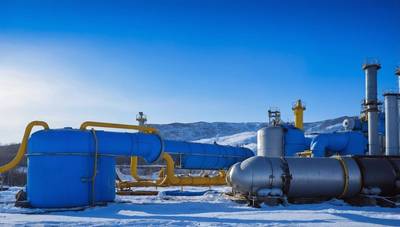The EU's plans to ban Russian gas
The European Commission proposed Tuesday legally binding measures to end the European Union's imports from Russia of gas and liquefied gas by the end 2027. This would put an end to decades-old energy relationships with Europe's ex-top gas supplier.
The details of the proposals are below. They still require approval by EU countries and the European Parliament.
THE TIMELINE
The ban will be implemented in phases. The EU will first ban imports of Russian gas and LNG under any new deals signed by the end this year.
From June 17, 2026 the EU will ban imports of short-term contracts for contracts signed prior to June 17, 2025.
The EU will also ban imports of Russian LNG and gas under long-term contracts, starting Jan. 1, 2028. This would mean that contracts with companies such as TotalEnergies, Naturgy and others which were meant to last into the 2030s will be terminated.
Contracts signed after June 17 2027 would prohibit EU LNG terminals from serving Russian customers as of Jan. 1, 2026. By January 1, 2028, services under long-term contracts signed before June 17, 2027 must cease.
About two-thirds (around two thirds) of Europe's Russian imports are covered by long-term contracts. The remainder is made up of short-term contracts and spot transactions.
QUALIFIED MAJORITY
The ban is based upon EU energy and trade law, which means it can be approved by a majority in the European Parliament and a strengthened majority of countries.
A strengthened majority is defined as having at least 15 out of 27 EU member countries supporting you, which represents at least 65% the EU population.
This was done to avoid the veto of its proposals by Slovakia and Hungary whose governments oppose the ban. The strongest legal basis to ban Russian gas would be sanctions, but this requires unanimous approval by all EU member states.
FORCE MAJEURE
EU diplomats have told EU member states that Spain, Belgium and the Netherlands, which all import Russian LNG, fully support this ban. However, they insist it needs to be strong enough legally to prevent firms from being subjected to fines or arbitration.
Legal experts have stated that it would be hard to eliminate this threat if the EU did not use sanctions. European buyers have contracts with Gazprom that require them to "take or pay" for the gas they are contracted to buy.
Officials from the Commission said that the legal measures would allow companies to use the clause in their contracts that states "force majeure", which is an event beyond anyone's control, to cancel their Russian gas contracts if they include it.
In order to enforce the ban, EU will require that companies disclose to customs authorities the volume, duration, and destination clauses in their Russian gas contracts.
REPLACING RUSSIAN SUPPLIES
Russia provided 19% of EU imports of gas last year through LNG and the TurkStream pipeline, supplying Hungary and Slovakia. This is far less than the 45% Russia supplied prior to its full-scale invasion in Ukraine in 2022.
The share of Russia is expected to drop further to 13% in this year.
The Commission stated that its proposals will not threaten Europe's supply of energy, as EU countries have spare LNG capacity or alternative pipeline routes by which they can import non Russian gas.
Commission: The EU infrastructure can import 250 billion cubic meters of LNG annually, but it only used half last year.
The EU has indicated its willingness to increase LNG imports to the United States to replace Russian supplies. President Donald Trump is pressuring Brussels to do so.
Switching to alternative energy sources will be expensive for Hungary and Slovakia. According to the Center for the Study of Democracy, Russian pipeline gas was offered at a discount of 13-15% compared to other options.
OIL and NUCLEAR
The EU has not imposed sanctions against Russian oil imports like it did with gas. However, Slovakia and Hungary still import over 80% of their crude oil from Russia.
On Tuesday, the Commission proposed that Slovakia and Hungary produce plans on how they plan to stop using Russian oil by 2027. Only 3% of the total EU oil imports come from Russia.
Brussels will also propose a number of measures to reduce the EU's dependence on Russian nuclear fuel, but it hasn't confirmed a specific date. (Reporting and editing by David Evans; Kate Abnett)
(source: Reuters)






